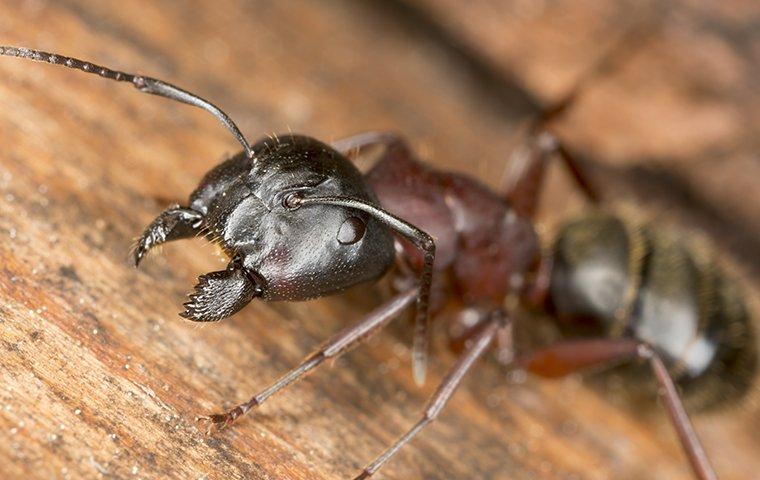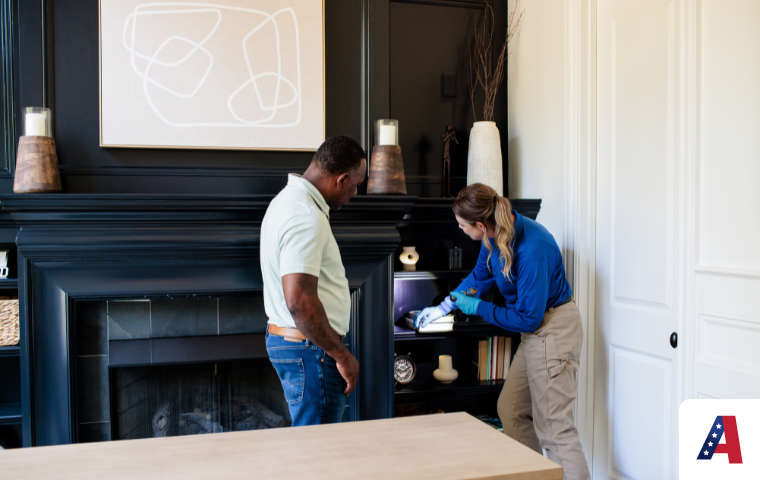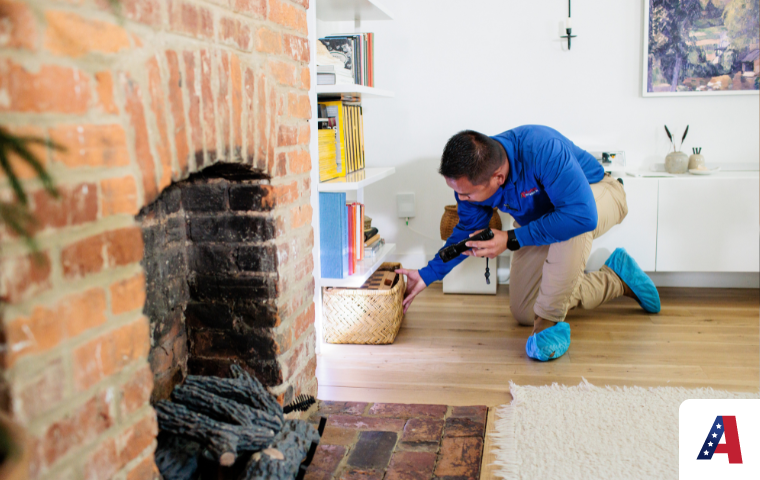Carpenter ants in Brentwood are potentially destructive pests. It is best to know as much as you can about them. In this quick resource, you'll find some of the most important facts to know to guard your property. We'll look at carpenter ant identification, how these ants damage your property, the factors that attract them, and how to properly deal with these pests. As always, we want to remind you that help is available if you need it. Our service team members can answer your pest control questions and offer industry-leading solutions for pest control in Brentwood. You don't have to battle pests alone! With that said, let's get started.

How To Identify A Carpenter Ant
We have quite a variety of ants in Brentwood. It can seem like a daunting task to tell what ants you're seeing on your property or inside your home. Fortunately, there are a few simple ways to identify carpenter ants and signs of carpenter ants in your home.
- Carpenter ants are the largest ants that will invade your space. In a colony, there are major and minor workers. They range in size from ⅛ to ½ an inch in length. They have six legs, two body parts, and two antennae. Most are black, but there are some species that are red or yellow. Black carpenter ants are the most destructive. If you find black carpenter ants in your home, contact All-American Pest Control immediately.
- Winged carpenter ants are reproductive ants. Their job is to make new nests. Reproductives are about twice as large as the workers. That means a winged carpenter ant can be over an inch long. Winged ants are often called swarmers because they gather into a swarm during the mating process. Finding carpenter ant swarmers on your Brentwood property is a warning sign of a current infestation.
- Carpenter ants produce a material called frass. If you find carpenter ant frass in your home, you can link it to the ants you're seeing. No other ant species in our area will create this material. Frass looks a bit like sawdust. We'll talk more about this in a moment.
- Carpenter ants have a preference for nocturnal activity. If you see black ants during the day, they are more likely one of several other species of dark brown or black ants we have in our area.
- Carpenter ants damage your wood. If you find ants crawling around inside a hole, and you're able to see stacked tunnels inside a wood hole, both are an indication that you're dealing with carpenter ants.
Once you're able to determine whether or not you're dealing with a carpenter ant infestation, the next step is to evaluate your pest control problem. Let's look at how carpenter ants damage your property and how you can track these ants down if you know what to look and listen for.
Carpenter Ants Do Not Eat Wood: They Just Chew It
There are a few important facts you should know about how carpenter ants can damage the wood inside your home. We've touched on the first. Let's start by looking at how you can use frass to help you with carpenter ant prevention and control.
Frass: When you have carpenter ants in your house, you may have trouble detecting them. They're pretty good at hiding. The frass material they create can alert you to the problem and help you tell where these ants are nesting. Frass is a mix of insect parts, droppings, and wood shavings. You may see it leaking from a gap or crack. It is somewhat sticky and may cling to surfaces. You may also see it piled on a surface.
Food: Since carpenter ants don't eat wood, they have to find food elsewhere. If you check their preferred hunting ground at night, you may shine a light on your pest problem. Literally. Use a flashlight to check your kitchen and pantry at night. Check around pet food dishes. Once you're done with your interior inspection, go outdoors and inspect your landscaping. Carpenter ants love honeydew produced by aphids, which are plant-damaging insects that live in vegetation.
Decay: It isn't easy for carpenter ants to chew tunnels in wood, so they often target water-damaged wood first because it's softer. Inspect decaying wood on your back deck, around your home's exterior, and on structures in your yard. You can also check stumps, logs, and dying trees for ant activity.
Noises: You may hear carpenter ants if you are sitting close to an area of a major infestation. They create a noise when they gnaw on wood. You may also hear the sound of their feet tapping on hard surfaces as they move quickly about inside your walls. Some describe carpenter ant noises as a rustling sound or the crinkling of cellophane.
When you detect carpenter ants, it is time to contact a professional. There is no easy fix for a carpenter ant infestation. It is best to have a service professional inspect your property, evaluate the infestation, and offer trusted solutions to arrest all ant activity.
Factors That Attract Carpenter Ants To Your Property
Long before carpenter ants find their way into your home and start causing damage to your property, there are ways you can work to deter them. These are smart, all-natural methods that require little or no knowledge of pest control. If you don't mind rolling your sleeves up and doing a bit of hard work, these tips are worth implementing.
- Carpenter ants are attracted to rotted wood. You can deter carpenter ant activity by replacing wood on structures, pulling out stumps, picking up sticks, removing logs, and storing campfire wood off the ground. You can also prevent wood rot by maintaining a working gutter system around your home.
- Carpenter ants have a preference for honeydew. If you take steps to deter aphids and other plant-damaging pests, you could also deter carpenter ants and other pests. Carpenter ants love honeydew so much, they tend to aphids and protect them as a farmer might protect cows. Reduce unnecessary moisture in your landscaping, remove aphids from your plants when you see them, and consider using yellow sticky traps to capture aphids.
- Carpenter ants use existing entry points. While they can chew through wood, they may not create a tunnel to get into your home. They'll likely exploit an opening that already exists and create tunnels once they find a suitable nesting location inside. Repair or replace weatherstripping, door sweeps, screens, frames, vent covers, and other protective materials. Use a caulking gun to seal around frames. Fill holes and gaps with expanding foam.
When factors are difficult to manage, or you want the level of protection that comes with having a year-round pest control service plan, contact All-American Pest Control for Perimeter Plus Pest Control in Brentwood. We provide coverage for over 47 different pests! That includes carpenter ants.
If carpenter ants find their way into your home and create a nest, what should you do about them? Is there an easy fix? Sadly, there isn't. Carpenter ant control is a complex process. It is best to hire a service professional to get a complete solution you know you can trust. Let's look at a few reasons why a professional is the right choice to deal with these unique pests.
Call The Pros At The First Sign Of Carpenter Ants
A carpenter ant problem is the kind of problem that will grow over time. These ants continually look for food while the queen creates offspring in the heart of the nest. When ready, reproductives are created. The reproductives leave the nest and mate with each other. Carpenter ant swarmers swarm in the spring. After the mating process, the male carpenter ants die and the queens attempt to make viable nests. Not all nests take root, but more and more nests are created over time. All of this can occur right under your nose, and right under your feet.
Another reason to go with a pest control service provider is that DIY carpenter ant control is tricky—as we pointed out already. Why is it such a challenge? Because carpenter ants have defensive behaviors and they work together to avoid danger. For example, incorrect application of bait can cause these ants to become bait averse. Carpenter ants work together to determine what foods are potentially hazardous. They do this in clever and unique ways, such as ongoing grooming, collection and disposal of their dead, and pheromone signaling.
When you get a professional home pest control treatment, you have the best chance of arresting all ant activity and establishing protection that will continue to protect your property well into the future. A professional will use field-tested methods and control products that are known to work.
Are you in Brentwood? If so, contact us and tell us about your ant control issue. We can guide you toward a solution that will work best for you. We have over 50 years of experience providing home and business owners quality pest control service with a smile. We can help!
We're Ready To Help
Call Our Office or Complete the Form To Get Your Customized Quote
 1449 Reviews
1449 Reviews




